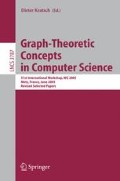Abstract
Consider a hyperstar H and a function ω assigning a non-negative weight to every unordered pair of vertices of H and satisfying the following restriction: for any three vertices u,v,x such that u and v belong to the same set of hyperedges, ω ({u,x}) = ω ({v,x}). We provide an efficient method that finds a tree-realization T of H which has the maximum weight subject to the minimum number of leaves.
We transform the problem to the construction of an optimal degree-constrained spanning arborescence of a non-negatively weighted directed acyclic graph (DAG). The latter problem is a special case of the weighted matroid intersection problem. We propose a faster method based on finding the maximum weighted bipartite matching.
Access this chapter
Tax calculation will be finalised at checkout
Purchases are for personal use only
Preview
Unable to display preview. Download preview PDF.
References
Beeri, C., Fagin, R., Maier, D., Yannakakis, M.: On the desirability of acyclic database schemes. Journal of the ACM 30, 479–513 (1983)
Brezovec, C., Cornuejols, G., Glover, F.: Two algorithms for weighted matroid intersection. Mathematical Programming, Series A 36, 39–53 (1986)
Cormen, T., Leiserson, C., Rivest, R., Stein, C.: Introduction to Algorithms. MIT Press, Cambridge (2001)
Korach, E., Stern, M.: The clustering matroid and the optimal clustering tree. Mathematical Programming, Series B 98(1-3), 385–414 (2003)
McKee, T., McMorris, F.: Topics in Interesection Graph Theory. Siam Monographs on Discrete Mathematics and Applications (1999)
Recski, A.: Matroid Theory and its Applications in Electric Network Theory and in Statics. Springer, Heidelberg (1989)
Schrijver, A.: Combinatorial Optimization: Polyhedra and Efficiency. Springer, Heidelberg (2003)
Swaminathan, R., Wagner, D.: On the consecutive-retrieval problem. SIAM Journal of Computing 23(2), 398–414 (1994)
Tarjan, R., Yannakakis, M.: Simple linear-time algorithms to test chordality of graphs, test acyclicity of hypergraphs, and selectively reduce acyclic hypergraphs. SIAM Journal of Computing 13, 566–579 (1984)
Author information
Authors and Affiliations
Editor information
Editors and Affiliations
Rights and permissions
Copyright information
© 2005 Springer-Verlag Berlin Heidelberg
About this paper
Cite this paper
Korach, E., Razgon, M. (2005). Optimal Hypergraph Tree-Realization. In: Kratsch, D. (eds) Graph-Theoretic Concepts in Computer Science. WG 2005. Lecture Notes in Computer Science, vol 3787. Springer, Berlin, Heidelberg. https://doi.org/10.1007/11604686_23
Download citation
DOI: https://doi.org/10.1007/11604686_23
Publisher Name: Springer, Berlin, Heidelberg
Print ISBN: 978-3-540-31000-6
Online ISBN: 978-3-540-31468-4
eBook Packages: Computer ScienceComputer Science (R0)

